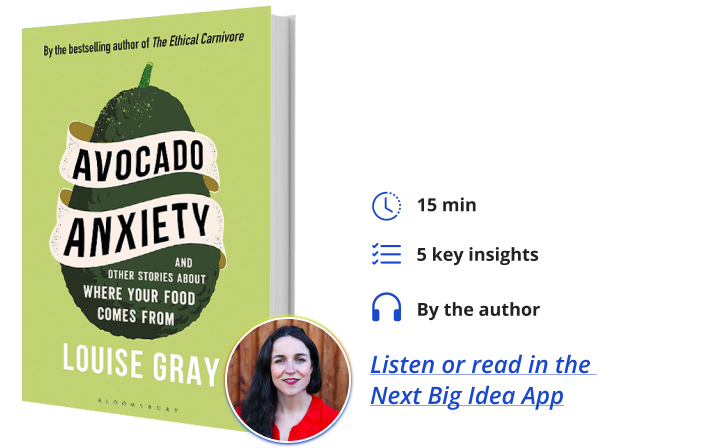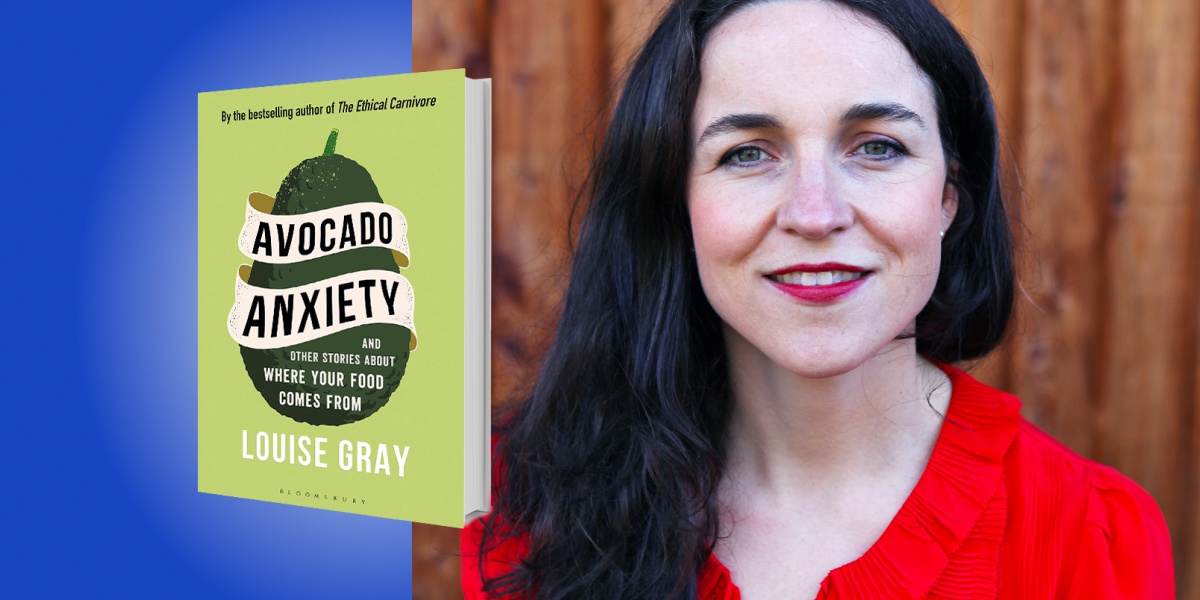Louise Gray is a writer and journalist who specializes in writing about food, farming, and climate change. In recent years, she has written for The Sunday Times, Scottish Field, the Guardian, and The Spectator, among others. She has also appeared on BBC television and radio. Her first book, The Ethical Carnivore, won Best Food Book and Best Investigative Work at the Guild of Food Writers Awards and was shortlisted for the Fortnum and Mason Food Book of the Year.
Below, Louise shares 5 key insights from her new book, Avocado Anxiety: and Other Stories About Where Your Food Comes From. Listen to the audio version—read by Louise herself—in the Next Big Idea App.

1. Eat less meat and more plant protein.
While writing my first book, I spent two years only eating animals I killed myself. It sounds brutal, and it was. I shot deer and rabbits, I skinned and butchered them and I ate them. I tracked farm animals all the way through the process from the farm to the abattoir. Killing animals is a serious task and if you are going to eat meat, you have to take responsibility for taking a life. Learning how hard it is to raise animals well and give them a good death made me want to eat less meat. I also wanted to eat less meat because it is better for the planet. A large proportion of greenhouse gas emissions caused by food production comes from livestock. I understand that cattle and sheep are a key part of our cultural heritage and in many areas, such as the Lake District in the UK, it can be done as part of a diverse and rich landscape. But globally we just have to eat less. So where do we get our protein?
Plant proteins can help us shift away from our reliance on meat. Legumes really are the answer. Fava beans or broad beans are not only really good for your health, but good for the environment, as they fix nitrogen in the soil, meaning the farmer uses less artificial fertilizers. They are cheap, versatile, and can be delicious! Just think about chilis, lentil stews, and hummus.
2. Cut food waste.
If food waste were a country it would be the third biggest greenhouse gas emitting nation after the US and China. In developing countries, much of the waste is crops rotting in the fields or food spoiled during transportation. But in developed countries, like the UK and the US, it is the consumer at home just being wasteful.
Big stores force farmers to waste a lot of food because they claim consumers will not eat imperfect fruits and vegetables. We have to convince them we are happy to eat wonky carrots and imperfect strawberries! Another solution is to plan our meals better so we don’t buy too much food, as well as use leftovers rather than throwing them away. Food waste can also be fed to pigs or chickens, composted to improve soil health, or made into an energy source by capturing the methane gas emitted as it breaks down.
“While frugality is admirable, it is likely not going to solve the problem alone.”
We all had grandparents telling us to be less wasteful and to clean our plates of food. While frugality is admirable, it is likely not going to solve the problem alone. A much better way to fight food waste is to look into modern solutions available via our phones. Apps like Olio mean you can share food if you have leftover bread or pick up food from a restaurant and shop rather than let it go to waste. Just the other day I rescued some hot cross buns from my local bakery that would otherwise have gone to waste. Businesses can also embrace the circular economy by using waste bread to make beer or wonky fruit to make wine.
3. Eat local, seasonal, and most importantly, lots of variety.
Food miles was a term invented in the 1990s to measure the distance food has traveled to get to our plates. There was great concern about the carbon emissions from flying a green bean from Kenya or Asparagus from Peru. Flying food thousands of miles does have an impact on the environment. It will make the carbon footprint of your shopping basket heavier but relatively speaking, it is a small part of our overall carbon budget. For example, you could buy 420 packets of green beans from Kenya for one return flight from Barcelona. There is also the argument for supporting farmers in developing countries like Kenya to get into export horticulture.
However, there are other reasons to eat local and in season. We need local farmers to provide a resilient food system. It connects you to the landscape and the nature around you. And it simply tastes better! Why would you want to eat a variety of apple that is in every store in the world when you can eat a variety of apple that is only found in an orchard near you?
The greatest reason for eating locally is because it forces you to get more variety into your diet. Variety is so important for our health and the environment. Studies show more variety can boost your gut microbiome and even your mental health. Diversity on farms helps boost wildlife. Ultimately, keeping diversity alive might hold the key to tackling climate change as new varieties may be able to withstand warming temperatures in the future.
4. Eat Fairtrade bananas (and Fairtrade avocados, if you can get them.)
Think of a banana and you smile, right? It is one of our favorite fruits and, while they are delicious, have you ever wondered why they are so cheap? Bananas were originally grown on scale on cleared rainforests in South and Central America. Today they are still a monoculture of one variety of banana, the Cavendish. This means the crop is susceptible to disease and multiple chemicals are used to keep an ongoing “banana pandemic” under control.
“Variety is so important for our health and the environment.”
By farming bananas a little differently—for example, allowing more space between rows, or “banana social distancing”—and introducing new varieties, chemical use could be cut down. Fairtrade bananas do just that and cost just a few cents more. It also means the people picking them are given a fair wage. In the US, Fairtrade avocados are increasingly available which means that this fruit is not linked to organized crime and labor abuses.
5. Please don’t be too anxious about it.
Has all of this made you feel terribly anxious about what you are going to have for lunch? Anxiety around food is never good. As a teenager and young adult, I suffered from bulimia and still today I will binge eat when feeling anxious. It is not something I am proud of, but it is something I am trying to forgive myself for. We all feel more anxious around food today and worrying about the environment can make matters worse. This happens especially if you are simply doom-scrolling on your phone, rather than finding proper information.
Avocados are a really good example of this. The fruit does not have a particularly heavy carbon footprint, but it does use up a lot of water. This means that water-scarce countries, like Chile, could end up using up their water to export avocados rather than feeding their own populations. We have a moral responsibility to make sure our food supply chain is not damaging other parts of the world. Again, this means diversity in our diets and in our farmed landscapes, so we do not rely on one fruit or vegetable. It means resilient local food systems that can provide a delicious sustainable diet. Growing your own fruits and vegetables and foraging for wild foods is a great way to supplement this—and possibly one of the best things you can do for mental health.
Millennials have been attacked for eating avocados on toast for brunch rather than buying a house. While it’s impossible to never eat avocados again, there are some facts and figures about where your avocados and other foods are from so you can make better decisions. You are what you eat, and if you can eat food that is kinder to the planet, it is kinder to you too.
To listen to the audio version read by author Louise Gray, download the Next Big Idea App today:
































